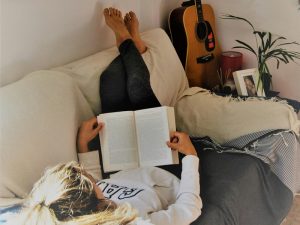I know, we read every day. Emails, captions, screens, signs. When was the last time you read a book? This simple activity seems to have fallen by the wayside, and like most wellness issues we address in the modern world, technology seems to play a big part in why it is so.
My Story
For me, the smell of a second-hand bookshop is a dopamine hit I can’t get anywhere else. The wave of happiness I feel as I flick through pages, read through synopses, and try not to judge by a cover is unmatched. Perhaps I am just nostalgic. Books have played a key part in my own story, chapters of my life footnoted with my own broken-spined copy of a tale that resonated or changed the course of my life. These tomes also sit proudly on display in bookshelves, as if to invite visitors to discuss them. There are stories I have read and reread and then reread gain. And if I close my eyes, I can see the words, made out in a serif font, and I can feel the rippled texture of the creamy book paper between my fingertips. You just don’t get that on a kindle or phone. And I certainly cannot recall with any emotion or sentimentality any line I have listened to, on the train through my earphones. Audio books, to me, are like instant coffee. Easy, quick, accessible, gets the job done, but ugh, not even close to the real thing.
Read All About It
Reading a (real) book; one with a cover and a spine and pages, is an activity that has many benefits.
Firstly, studies have proven that you are less likely to comprehend text read on an electronic device than you are on a printed page in a book. Anne Mangen of Norway’s Stavanger University, a lead researcher in one study, concluded that “the haptic and tactile feedback of a Kindle does not provide the same support for mental reconstruction of a story as a print pocket book does.”

Furthermore, did you know that you only know what you know unless you choose to know more? Reading expands your mind, gives you knowledge and broadens your thinking, making you an absolute delight at dinner parties. It cultivates empathy and cultural sensitivity. Books expose you to new words and can increase your vocabulary, giving you better communication skills, which can improve your relationships.
Next up, reading is literally the most relaxing of pastimes. It allows your mind to focus, without distractions (I’m talking about you, phone). You can immerse yourself in the story unfolding before you and put aside your current anxieties and stresses for just a little while.
Moreover, reading is like taking your brain to the gym. We understand the importance of exercise, and your mind is no different. Research shows that reading can lower your risk of Alzheimer’s and dementia.
As far as pre-sleep routines go, we’ve all heard of the effects blue light from devices have on our sleep. Lulling yourself into a relaxed state by the dim light of a bedside lamp, feeling your eyelids get heavier with each word is a much healthier bedtime ritual.
The Fine Print
Reading is a powerful pastime that is all at once mindful and purposeful, stimulating and relaxing. And, if you visit your local library, is free. Read any good books? is much more expansive a topic than, watched any good series, lately? Which are likely to have been based on a good book, anyway, by the way.









